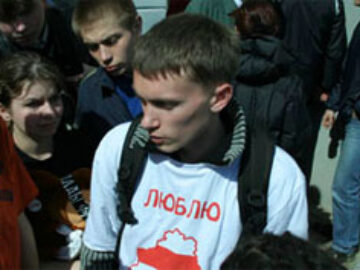Political prisoner Artsyom Dubski released from pre-trial detention center on his own recognizance

“Young Front” activist Artsyom Dubski was unexpectedly released from the Babruisk pre-trial detention center on his own recognizance until a trial.
Artsyom Dubski was at large in the evening April 15. The Charter’97 press center managed to phone Artsyom Dubski after his release.
“Major Kuturmin, acting chief of the detention center, entered my cell at 9.30 p.m. and ordered me collect personal belongings. I packed my bag quickly, I thought I would be transferred to another cell, this often happens. But unexpectedly, I was let free. I found myself in a town and don’t know at night, without any money on me. I phoned my mother and she told guys from the “Young Front”, and they came to me and took me to Asipovichy. I was released on my own recognizance pending trial. I think the trial will take place within two weeks. The case is bloated. I was interrogated only once in the detention center,” Artsyom Dubski said.
According to the political prisoner, detainees are treated cruelly in the Babruisk detention center.
I can give an example. According to the internal regulations, detainees are forbidden to lay on beds from 6.00 a.m. to 10.00 p.m., they can just seat on them. We must roll up our berths in the morning and lay them in the corner of the cell. But it’s impossible to seat on the beds as their frames are very uncomfortable for seating. We filed a complaint to the chief of the detention center. We read the regulations carefully and found out it was allowed to seat on beds with mattresses on them. Once we were watching TV in cell, four riot militiamen burst inside. We were jut watching TV, only 5 or 6 people could set at the table. The rest had to stand or seat on uncomfortable beds. But there were elderly people among us, so we decided to put a mattress on one of the beds. When riot militiamen saw this, they took us one by one to the inspection room, searched us, made us stand between two walls, leaning against one of the walls with hands and against the other one with feet, while you are beating with truncheons,” the youth activist said.
Artsyom Dubski suffers from stomach ulcer, but he wasn’t given necessary medicines in the detention center.
“According to them, they had all necessary medicines, but it is only for some people. Ordinary detainees can receive activated carbon and Vishnevsky ointment. When my ulcer exacerbated, I was given only pain-killers. Then they forbad to pass water to me for an unknown reason, though I couldn’t drink tap chlorinated water,” the “Young Front” activist tells.
Artsyom Dubski said some months in the pre-trial detention center were useful for him. “I saw how this system is working,” the young man says.
Dubski doesn’t regret having returned to Belarus and thrown into prison. “I probably must be here. I will return to Ukraine, my girl-friend lives there. But I will live in Belarus. Something should be changed here,” the political prisoner thinks.
Participant of the Process of 14 Artsyom Dubski had been in custody since February 13, 2009. He was arrested when he was returning to Belarus from Ukraine where he had lived before the trial. He must stand two criminal trials. He had a trial over allegedly stolen SIM card on March 3. The case was closed due to failure of evidence, but Artsyom wasn’t released. He is waiting for another trial under article 415 of the Criminal Code (evasion of service the sentence in the form of restriction of freedom).
The Case of Fourteen is a criminal case under article 342 of the Criminal Code of Belarus, instigated against participants of a peaceful protest demonstration of entrepreneurs held on January 10, 2008.
For participation in this protest a young activist Andrei Kim was sentenced to a year and a half in a penal colony (he was released in August 2008). An activist of the civil campaign “European Belarus” Alyaksandr Barazenka was sentenced to 1 year of restriction of liberty without sending him to a penal colony. He was kept in remand jail from October 27 to December 9, 2008. Other participants of the Process of Fourteen – Alyaksei Bondar, Artsyom Dubski, Mikhal Kryvau, Mikhal Pashkevich, Ales Straltsou, Ales Charnyshou, Tatsyana Tsishkevich, Mikhail Subach and Paval Vinahradau, were sentenced to 2 years of restriction of freedom without sending them to penitentiary institutions. Minor Maxim Dashuk got 1.5 years of restraint of liberty.
